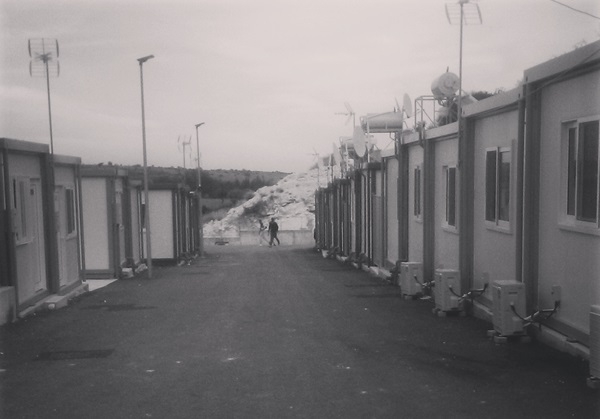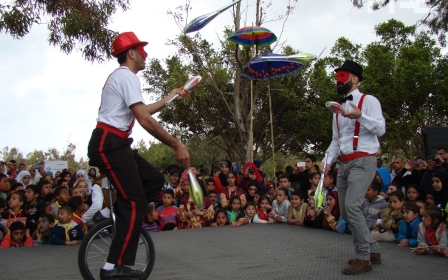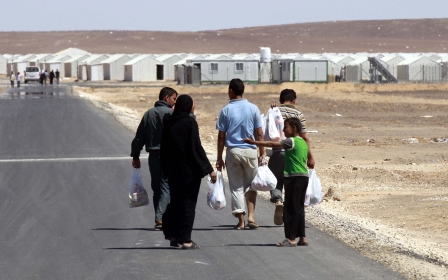Frontier dreams: How migration is impacting EU policy

NICOSIA - There is a model aeroplane sitting above the window of Yassin’s port-o-cabin home.
“It is a reminder of my journey,” he said, a withdrawn sort of smile appearing on one side of his mouth.
Yassin’s journey effectively ended the moment he claimed asylum in Cyprus. That’s why he and his family - a wife, three young daughters and two young sons - are currently living in Kofinou, the island’s only state-run reception facility for asylum seekers.
“After two years of war, the Palestinians couldn’t live in Syria anymore,” said Yassin, explaining why he ultimately took his family on a refugee boat from Turkey’s coast last September. “Both sides of the war treated us as enemies.”
But that’s not why Yassin applied for asylum.
Yassin suddenly produces a litany of medical documents; some from Syria, others with official-looking stamps in Greek. Yassin’s young daughter, Noura, has sickle cell, thalassemia and a high iron count in her blood.
“They made tests for my daughter and we got the same results as in Syria,” he explained. “The only option for her is to have surgery.”
Everyone inside Kofinou is given just 40 euros (as well as 10 euros for each dependent family member) per month. Packaged meals are delivered from a local business, although many complain that the quality is poor. They are free to go outside, although the centre is tucked-away amongst olive groves and fields around 25 kilometres from the nearest city, Larnaca. Transport links are limited.
A recently updated Asylum Information Database (AIDA) report also noted that “persons of concern are reluctant to move into the Kofinou Centre, as they consider the living conditions to be unsatisfactory”, whereas the vast majority who opt to live outside are “given no further access to state support”. Residents of Kofinou can, according to the law, remain in reception for a maximum of eight years.
Mathis Polydorou, head of the island’s asylum service, says Kofinou is a prime example of reception policy.
“Kofinou fits the criteria,” he told Middle East Eye in his Nicosia office, adding that the centre is funded by the European Commission and fits the “specific standards” set out by the EU. It has also received EU funding to expand capacity to 400, he says, five times its original size. “The system is sufficient.”
In Europe, each state is meant to provide a series of minimum, and common, standards for arrivals. But it is debatable whether Kofinou represents the same standard of reception as in popular destination countries like Sweden and Germany, where refugees undergo state-subsidised language courses and integration-orientation sessions. In Kofinou, father of four Abu Abed complains that his sons are given “high-level” Greek text books at a public school nearby. “[My son] goes to school and feels like he’s not there … while everyone’s talking Greek,” he said. “He hates school now.”
For many of the refugees from the boat, Kofinou was more necessity than choice - a rite of passage in the absence of any other.
Although they never wanted to come to Cyprus, some of the refugees here feel they have made the right choice by claiming asylum. The alternative was either temporary status on the island or turning to smugglers to try and get them to mainland Europe.
Omar, a 27-year-old Palestinian Syrian who fled the country to escape the possibility of a second military draft, came to believe he was “just wasting time without asylum”.
“I need status. Here, maybe I can continue my future - get a job and continue my studies, you know?” he said. “If I can just visit my relatives [already in Europe], it’s okay for me. These are bad days in Cyprus now, but I feel I could make something for myself here.”
Yassin, on the other hand, feels more worried about his decision with each passing day.
“Sometimes it looks like it might have been better not to have applied,” he said. “I want to say thank you to the government. But what will I do if I lose my daughter, because they’ve been slow and haven’t delivered on any of their promises?”
These are stories after the boat. But in the wake of unprecedented migration on Europe’s borders, which has already claimed the lives of more than 1,700 people in the Mediterranean this year, mainland EU migration policy has plunged into crisis.
Debate and discussion around Europe’s response to the Mediterranean crisis has often centred on search-and-rescue. However, in November last year, the European Council on Refugees and Exiles (ECRE) warned: “The dramatic scenes in the Mediterranean add to the long list of challenges the EU member states are facing in building and maintaining fair and efficient asylum systems.” Those challenges - far away from the tragedy unfolding at sea - have only grown. Hopes for a common asylum system or uniform mechanism for dealing with new arrivals, as well as the sharing of responsibility across member states, have all come into question.
Andrea Stocchierro, policy officer at Italy's Catholic NGO network, FOCSIV, says that while the European Commission’s comprehensive agenda on migration, scheduled to launch in May, “will try to improve harmonisation of national immigration policies”, longstanding issues stand in the way. This might impact the opening up of “humanitarian corridors”, legal routes into Europe through remote asylum processing or resettlement programmes, he says.
“For example, [foreign affairs and security policy chief Federica] Mogherini and her staff want to create humanitarian corridors and give asylum seekers [in countries like Egypt] the chance to come to Europe. But they face problems because many member states are not open to resettlement programmes,” Stocchiero told MEE in Rome.
“There are probably other people in the [European] Commission trying to balance a security approach with the possibility of opening up regular channels. But the final decision is not with the commissioners - the competence is with national governments. They have the power to create regular channels.”
EU member states have also started re-interpreting their obligations in response to record migration flows.
The Dublin Regulation outlines how member states should fingerprint and record arrivals on the EURODAC database. Once an asylum seeker is processed in that country, they cannot seek asylum elsewhere. If an asylum seeker tries to then claim elsewhere, after fingerprinting, they may be returned to the first country of arrival.
Member states have reportedly been discussing guidelines for “fingerprinting [with] the use of a proportionate degree of coercion”, according to Statewatch. At the same time, some countries themselves avoid fingerprinting, supposedly to pass the buck to other member states. Italy is often named as a country that does this. A recent Foreign Policy report even claimed this could open the door to Islamic State militants - an argument increasingly popular with Europe’s far right.
The future for Aly, a 43-year-old plumber from Homs, as well as his wife and three children, is far from certain because he was coerced into providing prints at his first point of arrival after crossing from Morocco to Melilla, one of two Spanish-controlled enclaves on the North African coast, and on to Spain.
Aly says he was “forced” to get fingerprinted having been threatened by Spanish police with detention if he did not comply.
“The Spanish government doesn’t care about the refugees and so people suffer a lot trying to get their rights and residency,” Aly told MEE from a Red Cross facility in Belgium, explaining his decision to head for another European country. Other refugees in the same facility interviewed by MEE recounted how they had passed through Italy without being fingerprinted.
Judith Sunderland, a senior researcher at Human Rights Watch in Europe, believes that many of these policy discussions come down to one word seemingly used more and more in EU meetings, like last week’s extraordinary summit on the crisis in the Mediterranean: responsibility.
“You can see, even from just reading the conclusions of the extraordinary summit last week, the reluctance of EU member states to accept responsibility … with respect to people fleeing persecution and war, people in need of international protection,” she told MEE. “And that reluctance plays itself out on a daily basis at the land borders of the EU, where we see fences going up, pushbacks, ill treatment - and we see it in the longstanding reluctance to go out and save lives in the Mediterranean.”
“It’s one thing to save people’s lives,” Sunderland said, “but it's another to then disembark them and have responsibility for processing their claims for international protection, or processing them for deportation.”
Waiting in Belgium, but at the possible risk of return back to Spain, Aly is bitter and uncertain about the future.
“Everyone dreams of travelling to Europe, but the reality is totally different,” he said, admitting that he forked out $14,000 after leaving Syria only to end up “disappointed”.
“Europe is a fake dream. We should not follow it.”
From state to state, mainland European migration policy can look promising, confusing or just immeasurably complex. But from a port-o-cabin in a reception centre in the Cypriot countryside, Aly Mohamed, another Palestinian Syrian in Kofinou, says it just looks like an illusion. He sees his experiences in Kofinou as far from the ideal he faced death for.
“We heard about ‘Europe’, but we didn’t find it here,” he said. “Here, they don’t even allow us to live in a room unless they’ve given us permission.”
“We took the risk of leaving Syria to live. What we found here instead was an illusion.”
This article includes reporting from Mahmoud El-Sobky in Brussels
New MEE newsletter: Jerusalem Dispatch
Sign up to get the latest insights and analysis on Israel-Palestine, alongside Turkey Unpacked and other MEE newsletters
Middle East Eye delivers independent and unrivalled coverage and analysis of the Middle East, North Africa and beyond. To learn more about republishing this content and the associated fees, please fill out this form. More about MEE can be found here.




